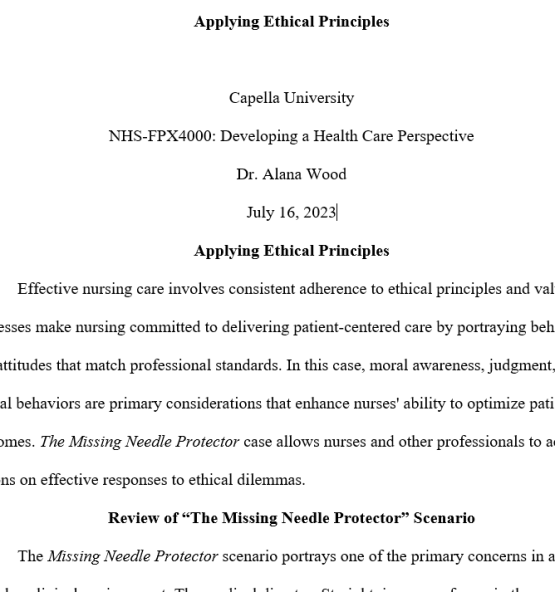


Applying Ethical Principles
Capella University
NHS-FPX4000: Developing a Health Care Perspective
February 12, 2023
Availability:In Stock
Applying Ethical Principles
Complexities within the clinical environment expose health leaders and the care team to various ethical challenges. One of the most common issues involve leaving an object in a patient’s body during a surgical operation. The scenario triggers consultations on whether to get the patient back into the surgical room or let them live with the object inside their body. The Missing Needle Protector highlights ethical challenges and the need for health leaders to make decisions based on moral awareness, moral judgment, and ethical behavior. This paper uses the case to engage readers on the value of making decisions that match clients’ best interests.
Reflection of the Case
Hopewell Hospital significant progress towards improving standards of care resonate with calls for evidence-based and patient-centered practices. The director of clinical services expressed desire to restore the hospital’s competitiveness by making adjustments across the facility (Capella University, n.d). However, complexities in the health sector makes the hospital vulnerable to scenarios that expose patients to complications, additional costs, and other adverse outcomes. The Missing Needle Protector offers an excellent example of errors, largely preventable ones that undermine the quality and safety of patient care. The operating room supervisor acknowledged a mistake that occurred during surgery. The director’s awareness about his roles and responsibilities explains the decision to seek clarification on events leading to the error.
The conversations revealed the need for comprehensive measures, characterized by a robust safety culture that make everyone responsive to ethical principles and standards. The case also highlighted the need for leaders to address power imbalances and hierarchical issues that undermine collective commitment to maintaining a safe clinical environment. For instance, meaningful progress is achievable when physicians or nursing with declining physical and psychological capabilities agree to handle less sensitive procedures. Incidents such as leaving a plastic needle protector from a disposable syringe in a patient’s belly jeopardizes progress made by the director of clinical services towards upholding the best standards of care (Capella University, 2022). The ethical dilemma in the case involves making informed decisions on whether to inform the patient, take her back into the surgical room, or avoid disclosing the details. This way, ethical decisions would require the director of clinical services to examine alternatives and make a decision that reflects commitment to meeting the patient’s best interests.
Ethical Decision-Making Framework
Ethical decisions mean complete knowledge of an issue and interventions necessary to fulfil duty of care to patients. Decisions should portray moral awareness, moral judgment, and ethical behavior (Capella University, 2022). The director responded well to moral awareness, which calls for ability to detect elements of a decision one makes. The director understood the nature of the error and the need for proactive efforts to identify the right solution. Moral judgment is another consideration that allows one to reflect on beliefs and perceptions about the wrong or correct action step (Capella University, 2022). The director’s actions meant that he understood the need to make the right decision after extensive consultations and understanding of the issue. Conversations with the nurse, supervisor, and chief of surgery showed the director’s desire to adhere to the principles of moral judgment.
The third consideration is ethical behavior, characterized by requirement for healthcare professionals to uphold honesty, dignity, and openness. For the director, ethical behavior involved making a decision that would safeguard the patient from severe complications and premature death associated with the error. Adhering to the provisions of the ethical decision-making model strengthens the safety culture, consequently making everyone committed to acting in ways that match a patient’s best interests.
Reviews
There are no reviews yet.